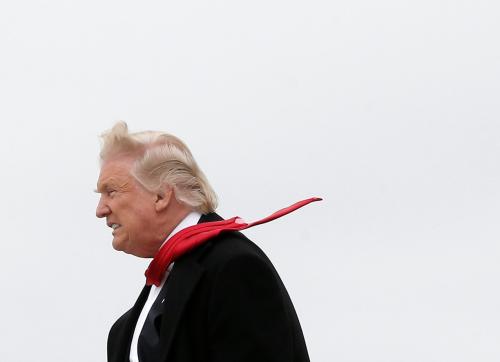President Bush gave his last speech to the United Nations this week, returning to many of the same themes he sounded in his first address before the General Assembly a few weeks after the 9/11 attacks in 2001. But the problems the U.N. faced seven years ago remain largely unaddressed, and the ability of the United States to address them has diminished.
The Security Council has grown increasingly divided since 2001. A newly activist and assertive China is no longer content to hide behind Russia or others. Moscow is threatening to return the Security Council to the stalemate of its first 40 years. U.S. policy, in the meantime, has been to criticize the institution, but rarely to act on the welcome if anodyne principle that President Bush enunciated at the General Assembly on Tuesday: The “United Nations and other multilateral organizations are needed more urgently than ever.” Instead, the United States did not take advantage of a fragile and short-lived consensus for change that developed in the aftermath of the Security Council breakdown in 2003 over Iraq.
The Security Council crisis in 2003 produced a series of efforts in the United Nations and the United States for reform. Kofi Annan was disliked in the White House and his flaws as Secretary General are well known. But he was a consistently pro-American Secretary General. On issues ranging from promoting democracy to human rights, Annan routinely put himself at odds with the U.N.’s non-democracies and in alignment with principles that the Bush administration propounded, but did not practice.
Annan commissioned the High-level Panel on Threats, Challenges and Change, which built a hard-fought North-South consensus spanning issues from the prevention of mass atrocities to peacekeeping to enlarging the Security Council. At home, former Speaker of the House, Newt Gingrich, and former Senate Majority Leader, George Mitchell, led a congressionally-mandated commission whose principle finding was “the firm belief that an effective United Nations is in America’s interests.” Their recommendations reflected a consensus that went beyond the narrow issues of managerial reform, focusing instead on a more profound rethinking of the U.N.’s role in light of changed international conditions.
The agenda for the next president will be to clearly define the role of the United Nations in U.S. foreign policy. Neither Democrats nor Republicans look to the United Nations as the exclusive or principal institution for advancing American foreign policy goals or interests. At the same time, the United Nations can and has been relevant in addressing first and lower-order security concerns.
The next administration should focus on two main goals for the United Nations. The first is to work to improve the position and standing of the United States at the United Nations so that Washington can better influence the institution at important moments. Second, the next administration should work intently with the United Nations and other states to enhance the capacity of the U.N. to act so that it is better able to carry out critical missions, especially in the areas of peacekeeping and global health and development. This also requires that the United States support and encourage efforts to make the Security Council a more representative body, in order to sustain and enhance the legitimacy of the Security Council, while improving its effectiveness and decision making capacity. Finally, rather than stand aside, the United States must adopt an activist policy to help reestablish the United Nations as a place that embraces rather than mocks the principles embodied by the Universal Declaration of Human Rights, one of the founding documents of the United Nations, adopted as a companion to the U.N. Charter.
The Bush administration made progress in one very important area and that was to support the adoption of the “Responsibility to Protect” at the General Assembly in 2005. The Responsibility to Protect is the concept that state sovereignty entails responsibilities as well as rights, and first and most fundamentally the obligation not to do genocide, and to act to prevent and stop mass atrocities within one’s own borders. That consensus has since badly frayed as the pallid international response to mass killings in Darfur demonstrates.
Over the last seven years, the United States has often scolded the United Nations but only half heartedly, if at all, worked to fix what is broken. The next administration will have an opportunity, and a need, to be a more forceful and more effective advocate of U.S. interests and values at the United Nations.
The Brookings Institution is committed to quality, independence, and impact.
We are supported by a diverse array of funders. In line with our values and policies, each Brookings publication represents the sole views of its author(s).



Commentary
Op-edU.S.-U.N. Relationship: 2009 and Beyond
September 24, 2008